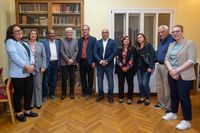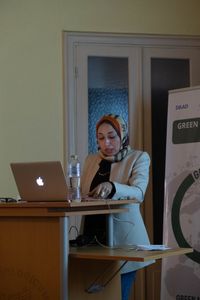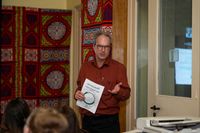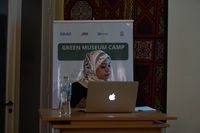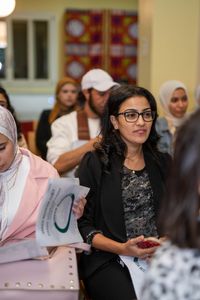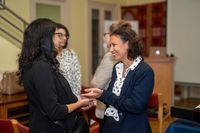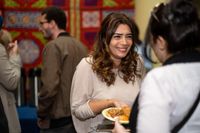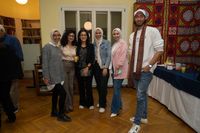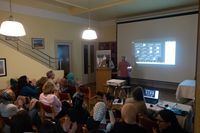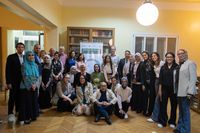GreenMuseumCamp Tunis 2025
December 4th 2025 marked the final GreenMuseumCamp conference on sustainability and long-term strategies for climate protection in museums and heritage sites. Its hybrid strategy allowed for an exchange both in person on site in Tunis, as well as in the digital space. Whilst being the final of three conferences in the GreenMuseumHub project, coordinator Amgad Fouda explains:
"There is a undeniable sadness in seeing such a vibrant and supportive platform, which has been a true catalyst for innovation, reach its end. The connections forged and the projects born from this initiative are a testament to its immense value.
However, the conference was not an end, but a powerful launchpad. While one chapter closes, new ones are already being written. The horizon is bright with new opportunities and promising partnerships. I am particularly excited about the burgeoning connections we made with new collaborators from across the Middle East and North Africa region. The shared challenges and ambitions we discovered promise a new era of cross-border cooperation for new powerful projects."
from the LinkedIN profile of Amgad Fouda, project coordinator
GreenMuseumCamp Cairo 2024
Pioneering Sustainability in Museums Through International Collaboration
The Green Museum Camp, a groundbreaking conference held in Cairo on November 13–14, 2024, marked a significant step forward in the global effort to make museums leaders in sustainability. Hosted at the German Archaeological Institute (DAI), the event was part of the larger Green Museum Hub project, funded by the DAAD funding line Ta’ziz. The conference brought together museum professionals, academics, and students to explore innovative ways to integrate sustainable practices into museum operations and exhibitions. Helping museum experts to know how to make museums lead by example in the field of sustainability.
A Collaborative Effort Across Borders
The Green Museum Hub project is a shining example of international cooperation, uniting three countries— Germany, Tunisia, and Egypt—along with three universities, Julius Maximillians-Universität Würzburg, Université de La Manouba Tunis, and Helwan University Cairo. Alongside with partner museums Joining forces from all three countries. This collaboration aims to equip museum experts with the necessary tools and knowledge needed to transform museums into role models of sustainability. By sharing expertise and resources across borders, the project fosters a global network of institutions committed to reducing their environmental impact while continuing to preserve and showcase cultural heritage.
Highlights from the Conference
The Green Museum Camp featured an impressive lineup of speakers who addressed a wide range of topics related to sustainability in museums. Among the notable presentations were:
- Dr. Osama A.W. Abel Maguid Chair ICOM Egypt, and his topic was “CLIMATE CHANGE MITIGATION AND ADAPTATION OF MUSEUMS IN EGYPT”
Dr. Osama shared theories from ICOM to help design exhibitions that minimize environmental impact while maintaining visual appeal.
- Dr. Jens Bortloff Administrative Director at TECHNOSEUM (Germany): “Towards climate neutrality: how the TECHNOSEUM is trying to achieve it.”
Dr. Jens discussed practical strategies for retrofitting museum buildings to improve energy efficiency and reduce operational costs.
- Ms. Shereen Abd Ul Raouf, Head of Textile & Basketry Conservator Lab at NMEC (Egypt): “Ongoing approach towards ‘Green Conservation’ in NMEC”
Ms. Shereen emphasized the role of museums in using eco and environmentally friendly materials instead of the chemical ones in the conservation process, which will help reducing cost and more effective into preventive conservation.
- Dina Gohar, Curator & Responsible for Sustainability File & Green Museums at The Central Administration of Regional Museums (Egypt): “Community Engagement Strategies in Green Museums”
Ms Dina shared a various experiments held by museums engaging communities and demonstrated the power of community engagement into spreading awareness about sustainability. With the attendance of Professors like Lamya Ben Abid, Guido Fackler, and Aly Abd Allah, who are leading the project, helped create a deeper discussion among the attendees both, physically and online.
A Hybrid Format with Broad Reach
The conference was held in a hybrid format, allowing both in person and online attendance. This approach proved to be highly successful, with a significant number of participants joining virtually from around the world. The hybrid format not only expanded the conference’s reach but also demonstrated the potential for reducing the carbon footprint of large-scale events. Feedback from attendees highlighted the convenience and inclusivity of the online option, with many praising the seamless integration of virtual and in-person sessions.
A Diverse Audience
The Green Museum Camp attracted a diverse audience, ranging from museology students and early-career professionals to seasoned museum experts & employees. This mix of perspectives enriched the discussions and underscored the importance of engaging the next generation of museum leaders in sustainability efforts. The high turnout—both in person and online—reflected the growing interest in sustainability within the cultural sector.
A Step Toward a Greener Future
The Green Museum Camp and the broader Green Museum Hub project represent a vital step toward a more sustainable future for museums. By fostering international collaboration and sharing best practices, the initiative empowers museums to lead by example in the fight against climate change. As the cultural sector continues to grapple with the challenges of sustainability, events like this provide a roadmap for institutions worldwide to follow. The success of the Green Museum Camp is a testament to the power of collaboration and innovation. With the momentum generated by this conference, the Green Museum Hub is poised to make a lasting impact on the museum world, proving that sustainability and cultural preservation can go hand in hand.
Report written by Amgad Fouda, February 2025
GreenMuseumCamp Würzburg 2023
How Museums are Becoming Greener
Museums have some catching up to do when it comes to sustainability and climate protection. A trinational project at the University of Würzburg with partner universities from Tunisia and Egypt aims to find solutions.
When it comes to sustainability, most people probably think of things like mobility and energy transition, organic farming and avoiding waste. However, in addition to these central pillars, the topic also plays an important role in countless other areas, such as art and culture.
Museums are a particular focus here. In 2021, German government representatives from the federal and state governments, together with the German Museums Association, decided on an initiative for more climate protection and sustainability in museums.
Julius-Maximilians-Universität Würzburg (JMU) is now launching a project together with two North African universities that is dedicated to precisely these goals: GreenMuseumHub: Sustainable Futures for Museums and Heritage Sites. The aim is to encourage a lively exchange of experiences, challenges, and possible solutions.
A Considerable CO2 Footprint
Guido Fackler, Professor of Museology at JMU, is leading the trinational project. He is aware of the challenges museums face when it comes to sustainability: "Unfortunately, museums are often among the biggest CO2 polluters among cultural institutions. There are various reasons for this. For example, the climatic requirements for certain exhibits or the structural conditions in large old buildings, which are often anything but optimal in terms of energy."
Museums consume a lot of energy for heating and air conditioning, as many exhibits require special climatic conditions. Added to this is the fact that exhibitions are often staged with unsustainable materials that often end up as waste after they are finished.
"Possible approaches would be slightly less stringent temperature management, the use of more ecological materials or even more modular components that could then be reused for later exhibitions. We want to work with our partners over the next few years to find out what works, including in terms of social sustainability," says the museologist.
The GreenMuseumHub will work out exactly what such adaptations and new developments could look like through exchange, training, and scientific research.
Experience from Three Countries
Guido Fackler was able to gain Helwan University in Cairo and the Université de la Manouba in Tunis as international partners. The exchange takes place in regular video conferences, workshops, and courses. In addition, they will meet once a year for the GreenMuseumCamp. The first edition in cooperation with WueLab took place in Würzburg at the beginning of December and laid a promising foundation for the project with workshops, digitally transmitted lectures translated into Arabic and an excursion.
Professor Lamia Ben Abid says of the particular challenges regarding sustainability in Tunisia: "Tunisia has committed itself to the United Nations Sustainable Development Goals. Renewable energies, waste reduction and recycling are also major issues here. As are the effects of global warming. So, we have many common starting points." In this regard, the Egyptian Ministry of Antiquities has already selected several museums that will serve as pioneers, reports Professor Aly Omar Aly Abdalla.
In addition to the three universities, the network so far includes around 25 museums, partners from industry, NGOs, an educational institution, a state authority, and two higher education institutions.
Exhibition as a Conclusion
In addition to making museums and heritage sites more sustainable, the aim is also to discuss how the topic of sustainability can be communicated to the general public in exhibitions.
To this end, a multilingual pop-up exhibition in physical and digital form is to be designed over the three-year funding phase by the German Academic Exchange Service (DAAD).
At JMU, project coordinator Elisabeth Greifenstein is also planning to closely link the topic with museology teaching: "We can well imagine offering hybrid seminars and final theses as part of the project and are also trying to create exchange opportunities for students through other programs."
Text
© by Lutz Ziegler, University of Wuerzburg Press, lutz.ziegler@uni-wuerzburg.de


